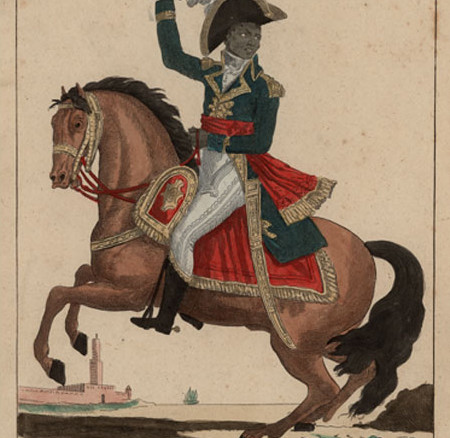
Little is known for certain about Toussaint Louverture’s early life, as there are contradictory accounts and evidence about this period. The earliest records of his life are his recorded remarks and the reminiscences of his second legitimate son Isaac Louverture. Most histories identify Toussaint’s father as Gaou Guinou, a younger son of the King of Allada (also spelled Arrada), a West African historical kingdom located in modern-day Benin, who had been captured in war and sold into slavery. His mother Pauline was Gaou Guinou’s second wife. The couple had several children, of whom Toussaint was the eldest son.
Toussaint is thought to have been born on the plantation of Bréda at Haut de Cap in Saint-Domingue, which was owned by the Comte de Noé and later managed by Bayon de Libertat. His date of birth is uncertain, but his name suggests he was born on All Saints Day. He was probably about 50 at the start of the revolution in 1791 and various sources have given birth dates between 1739 and 1746
Toussaint is believed to have been well educated by his godfather Pierre Baptiste though Historians have speculated as to what degree Toussaint’s intelligence was.
His extant letters demonstrate a command of French in addition to Creole patois; he was familiar with Epictetus, the Stoic philosopher who had lived as a slave; and his public speeches as well as his life’s work, according to his biographers, show a familiarity with Machiavelli. Some cite Abbé Raynal, who wrote against slavery, as a possible influence: The wording of proclamation issued by then rebel slave leader Toussaint on August 29, 1793, which may have been the first time he publicly used the moniker “Louverture”, seems to refer to an anti-slavery passage in Abbé Raynal’s “A Philosophical and Political History of the Settlements and Trade of the Europeans in the East and West Indies.”
He may also have attained some education from Jesuit missionaries. His medical knowledge is attributed to familiarity with African herbal-medical techniques as well those techniques commonly found in Jesuit-administered hospitals.
However, A few legal documents signed on Toussaint’s behalf between 1778 and 1781 raise the possibility that he could not write at that time. Throughout his military and political career, he made use of secretaries for most of his correspondence. A few surviving documents in his own hand confirm that he could write, though his spelling in the French language was “strictly phonetic.”
Toussaint Louverture began his military career as a leader of the 1791 slave rebellion in the French colony of Saint-Domingue; he was by then a free black man and a Jacobin. Initially allied with the Spaniards of neighboring Santo Domingo, Toussaint switched allegiance to the French when they abolished slavery. He gradually established control over the whole island and used political and military tactics to gain dominance over his rivals. Throughout his years in power, he worked to improve the economy and security of Saint-Domingue. He restored the plantation system using paid labour, negotiated trade treaties with Britain and the United States, and maintained a large and well-disciplined army.
In 1801, he promulgated an autonomist constitution for the colony, with himself as Governor-General for Life. In 1802 he was forced to resign by forces sent by Napoleon Bonaparte to restore French authority in the former colony. He was deported to France, where he died in 1803. The Haitian Revolution continued under his lieutenant, Jean-Jacques Dessalines, who declared independence on January 1, 1804. The French had lost two-thirds of forces sent to the island in an attempt to suppress the revolution; most died of yellow fever.
Legacy
influenced John Brown to invade Harpers Ferry. John Brown and his band captured citizens, and for a small time the federal armory and arsenal. Brown’s goal was that the local slave population would join the raid. But things did not go as planned. He was eventually captured and put on trial, and was hung on December 2nd 1859. Brown and his band of brothers shows the devotion to the violent tactics of the Haition Revolution. During the 19th century African Americans used Toussaint Louverture as an example of how to reach freedom. Also during the 19th century Britain used Toussaint domestic Life and ignored his militancy to show Toussaint as a non-threatening rebel slave.
Toussaint Louverture’s military genius and political acumen transformed an entire society of slaves into the first successful slave uprising that led to the independent state of Haiti. It was the greatest slave uprising since Spartacus, who led the revolt against the Roman Republic. The success of the Haitian Revolution shook the institution of slavery throughout the New World.
